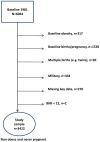Short inter-pregnancy intervals, parity, excessive pregnancy weight gain and risk of maternal obesity
- PMID: 23595566
- PMCID: PMC3840151
- DOI: 10.1007/s10995-013-1272-3
Short inter-pregnancy intervals, parity, excessive pregnancy weight gain and risk of maternal obesity
Abstract
To investigate the relationship among parity, length of the inter-pregnancy intervals and excessive pregnancy weight gain in the first pregnancy and the risk of obesity. Using a prospective cohort study of 3,422 non-obese, non-pregnant US women aged 14-22 years at baseline, adjusted Cox models were used to estimate the association among parity, inter-pregnancy intervals, and excessive pregnancy weight gain in the first pregnancy and the relative hazard rate (HR) of obesity. Compared to nulliparous women, primiparous women with excessive pregnancy weight gain in the first pregnancy had a HR of obesity of 1.79 (95% CI 1.40, 2.29); no significant difference was seen between primiparous without excessive pregnancy weight gain in the first pregnancy and nulliparous women. Among women with the same pregnancy weight gain in the first pregnancy and the same number of inter-pregnancy intervals (12 and 18 months or ≥18 months), the HR of obesity increased 2.43-fold (95% CI 1.21, 4.89; p = 0.01) for every additional inter-pregnancy interval of <12 months; no significant association was seen for longer inter-pregnancy intervals. Among women with the same parity and inter-pregnancy interval pattern, women with excessive pregnancy weight gain in the first pregnancy had an HR of obesity 2.41 times higher (95% CI 1.81, 3.21; p < 0.001) than women without. Primiparous and nulliparous women had similar obesity risk unless the primiparous women had excessive pregnancy weight gain in the first pregnancy, then their risk of obesity was greater. Multiparous women with the same excessive pregnancy weight gain in the first pregnancy and at least one additional short inter-pregnancy interval had a significant risk of obesity after childbirth. Perinatal interventions that prevent excessive pregnancy weight gain in the first pregnancy or lengthen the inter-pregnancy interval are necessary for reducing maternal obesity.
Figures
References
-
- Williamson DF, Madans J, Pamuk E, Flegal KM, Kendrick JS, Serdula MK. A prospective study of childbearing and 10-year weight gain in US white women 25 to 45 years of age. Int J Obes Relat Metab Disord. 1994;18:561–9. - PubMed
-
- Rosenberg L, Palmer JR, Wise LA, Horton NJ, Kumanyika SK, Adams-Campbell LL. A prospective study of the effect of childbearing on weight gain in African-American women. Obes Res. 2003;11:1526–35. - PubMed
-
- Coitinho DC, Sichieri R, D’Aquino Benicio MH. Obesity and weight change related to parity and breast-feeding among parous women in Brazil. Public Health Nutr. 2001;4:865–70. - PubMed
Publication types
MeSH terms
Grants and funding
LinkOut - more resources
Full Text Sources
Other Literature Sources
Medical



